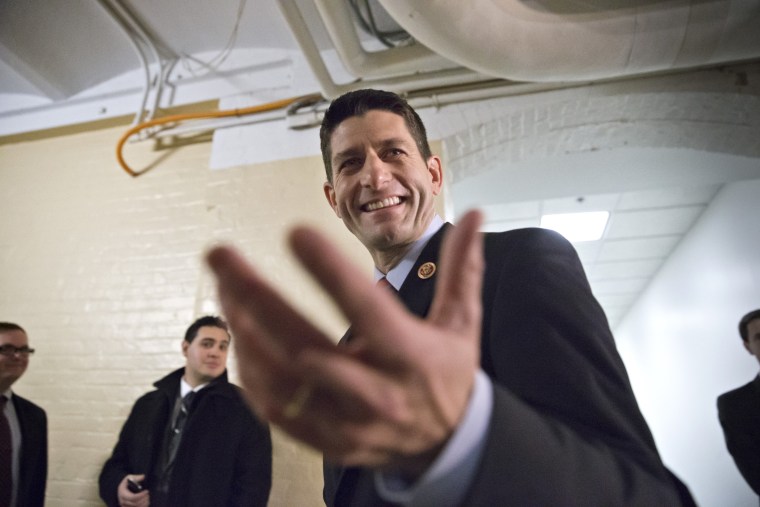Because federal spending levels for this fiscal year and the next are already set, there was no practical reason for House Budget Committee Chairman Paul Ryan (R-Wis.) to unveil a budget blueprint last week. Indeed, since it'll never be approved by the Democratic Senate, the mere introduction of the plan was an obviously political exercise -- more a statement than an attempt at governing.
House Republicans put an exclamation point on that statement in a vote this afternoon.
The House narrowly approved Rep. Paul D. Ryan's spending blueprint Thursday, 219-205. It's an important symbolic victory for the Wisconsin Republican and potential GOP presidential contender. No Democrats voted for the 10-year-spending plan and the bill won't go anywhere in the Senate, but the document has come to represent a marker for where the Republican Party, its leaders and rank-and-file House members stand on fiscal policy. Twelve Republicans defected.
There was some chatter last week that House GOP leaders were worried about a possible defeat, but it appears members largely fell into line after some behind-the-scenes lobbying and arm-twisting. That said, 12 defections is a little high -- when Ryan budgets came to the floor in 2013 and 2012, 10 Republicans broke ranks and opposed the plans in each instance. [Update: here's the roll call for today's vote.]
Regardless, this is a very far-right budget plan, which drew the backing of 95% of the House Republican caucus -- even in an election year, even though they knew its provisions have no chance of becoming law.
And that's a vote that will very likely launch a thousand Democratic TV ads. As Senate Majority Whip Dick Durbin (D-Ill.) said last week, "Thank you, thank you Congressman Paul Ryan, for reminding us what Republicans would do if they had control."
Why are Dems so excited to run against Ryan's plan? Here's a recap of some of the top-line highlights we talked about last week:
* Ryan's plan would cut spending more than $5 trillion over the next decade, despite the roll spending cuts have played in undermining economic growth.
* It would replace Medicare with a privatized voucher system for future retirees.
* It would repeal the Affordable Care Act, taking coverage away from millions, while slashing Medicaid. It would then increase defense spending.
* The blueprint would be brutal towards the poor, and includes practically nothing in the way of poverty "reforms" that Ryan recently expressed an interest in.
* Ryan would scrap funding to combat the climate crisis.
* The plan would slash the top marginal tax rate from 39.6% to 25% -- giving the wealthy a massive tax break -- but largely ignores Dave Camp's plan for systematic tax reform.
The $5.1 trillion in cuts are of particular interest, not just because they're needed to finance another tax break for the rich, but also in light of how brutal they would be to critical public services. As the Center on Budget and Policy Priorities noted, the cuts focus on several key areas -- health coverage, food assistance, college affordability, etc. -- and the estimates are almost certainly understating the case. (Ryan tried to push back against the CBPP's findings, but his argument "makes little sense.")
This is, in other words, a plan to redistribute wealth quite radically -- from the bottom to the top.
It's the kind of governing vision that the American mainstream will likely find offensive. Congressional Dems, who plan to run aggressively against the Ryan plan in the coming months, are counting on it.
